Putin's Russia is Far More Complicated than a Mere Autocracy
Editor's note: This article was originally published in 2012.
Winston Churchill famously called Russia “a riddle, wrapped in a mystery, inside an enigma” — a phrase that makes me cringe when it shows up in contemporary journalism or student papers. Part of the problem is that we forget Churchill’s point: there is a key, “Russian national interest.” We are left with a dismissive cliché about Russia as strange and incomprehensible, and thus probably dangerous. Yet this may be less harmful than clichés about how Russians love a strong ruler; Russians have no historical experience with democracy so cannot understand it; Russia will always be alien to “western” values. Frankly, if we want to understand Russia, we may be better off finding Russia mysterious — knowing that there are no easy answers or certainties.
Soon after Vladimir Putin’s first election as president in 2000, a satirical picture circulated blending Putin’s face with the Mona Lisa. The logic of Mona-Lisa-Putin made sense in these early years. We don’t know what he is smiling about (or even if that is a smile!). We don’t know his ideology or how he will rule Russia. Putin is an enigma.
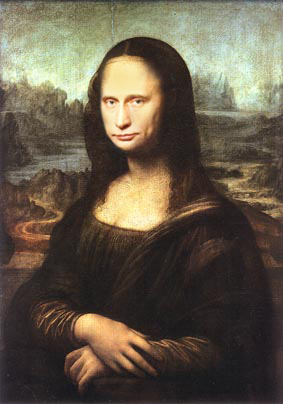
Now, we think we know. Putin has emerged as a new tsar, a dictator, whose goal, as a current American presidential candidate has typically argued, echoing a commonplace, is “above all else to preserve his power.” Certainly, Putin has fuelled these arguments. From the first, he did all he could to strengthen the “vertical of power,” asserting more state control over the economy and the regions, bringing the media under almost complete control (especially television), reigning in NGOs and other independent civic organizations, and marginalizing the opposition (when not throwing critics into prison). The symbolic embodiment of this political personality is a hypermasculine, tough-man persona, most visible in regular photo-ops with chest bared while engaged in vigorous physical activity, along with periodic use of vulgar language to denigrate his critics. A real man, his admirers say.
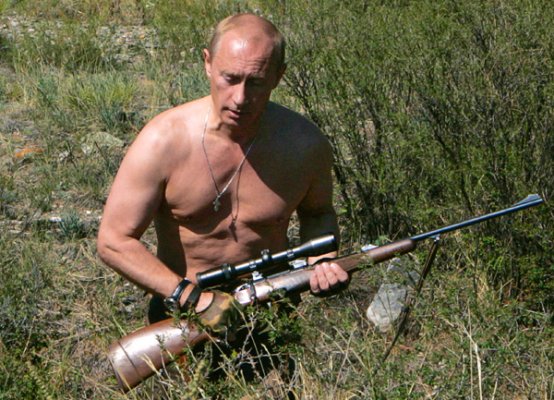
Putin’s return to the presidency on May 7, 2012 looks like part of this clear picture of growing autocratic power (and if he can ensure that voters continue to agree, he will remain president until 2024). Indeed, even when Putin stepped aside in 2008, as required by the constitution, to become prime minister beside his chosen successor and ally Dmitry Medvedev, most people recognized that he remained the “alpha dog” (the apt and even flattering name given to Putin in US diplomatic cables).
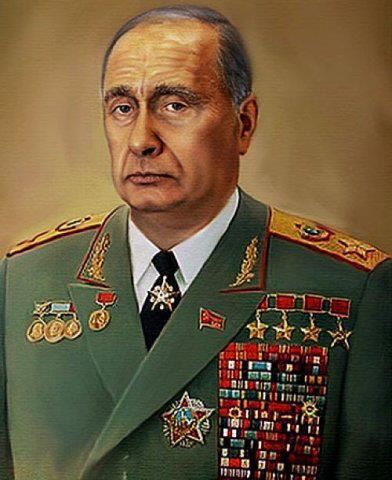 Recently, another satirical portrait of Putin has been making the rounds — this time merging his face with Leonid Brezhnev, whose long years ruling the Soviet Union are said to have begun the “era of stagnation” that ended in the collapse of communism. The message is clear: we are going “back to the USSR,” especially its twilight years of decrepit conservatism, self-satisfied complacency, and suppression of alternative voices.
Recently, another satirical portrait of Putin has been making the rounds — this time merging his face with Leonid Brezhnev, whose long years ruling the Soviet Union are said to have begun the “era of stagnation” that ended in the collapse of communism. The message is clear: we are going “back to the USSR,” especially its twilight years of decrepit conservatism, self-satisfied complacency, and suppression of alternative voices.
But is “Putinism” really so simple and clear? I think we need to take seriously Putin’s contradictoriness. Putin envisions himself being inscribed in history as a great leader in line with earlier Russian modernizers, especially Peter the Great (and, in different ways, Stalin), but also international figures like Franklin Roosevelt (a self-comparison worth pondering). Like his heroes, Putin’s vision is imbued with tension, such as the belief that a strong state is necessary for national progress and greatness, but a definition of progress that requires greater freedom, citizen participation and power, and growing economic opportunity. As he typically declared during his 2000 election campaign, “the stronger the state, the freer the individual.” If we can understand how this makes sense, we can understand the complexities of Putinism better. It is too easy to say that his talk of democratic and liberal principles is merely a fig leaf. At times, though, his words do ring hollow: as when he declared in his recent inauguration address that his ideal for Russia was nothing less than “freedom, truth and justice,” while demonstrators were being arrested in the streets.
But Putin is not the only one making history in Russia. He knows full well that an active citizenry is essential to Russia’s success, and he often says so. He would prefer civic participation be disciplined and orderly: a “managed democracy” where citizens all pull together in the same (correct) direction under firm guidance. The remarkable thing about Russian public life today is that many people are unwilling to be harnessed — indeed, the very idea that democratic civic life be managed inspires contempt and action.
There have been street marches by the disaffected for years, but nothing like the massive and persistent presence of citizens in the streets of Moscow, St. Petersburg, and other large cities that began in December 2011 in response to the outcome of parliamentary elections, which many believed were falsified. Again and again, many thousands of people, mostly professionals and educated young people — the often desired “middle class” — have taken to the streets. The demands have been both particular and sweeping: new elections and election laws, ending the power of “the party of swindlers and thieves,” a vital civil society, truth not lies.
Most remarkable has been the mood on the street. Partly we sense outraged disgust: at the arrogance of the elites, at cynicism, at the insult of being “managed.” But coupled with this has been humor — jokes in great number (especially about Putin) and hand-made signs full of puns and irony — and a mood more festive than angry. Of course, Russian history is littered with democratic social movements that briefly flared up and then declined into romantic memory of heroic defiance. But for now, the movement continues and spreads. Perhaps, as some have said, this is a “Russian spring” that will transform Russian politics and society. Perhaps, as others argue, this will be a catalyst for renewed authoritarianism and state violence, especially since most of the country is not involved. There are strong signs of both.
But I want to pause over the laughter. Writers over the years have noted the many forms and meanings of laughter: life-affirming laughter, laughter through tears, the laughter of resignation, pessimistic laughter, the laughter of defiance, the laughter of contempt, escapist laughter, and more. All of these can be heard on the Russian street. What is most striking, though, is precisely that there is so much political laughter — and it is much bolder and more public than at any time in Russian or Soviet history. Sometimes the humor is outrageous, as in the satirical performance by the feminist punk band “Pussy Riot” in the cathedral most closely associated with the Russian Orthodox church as an establishment institution and with the government.
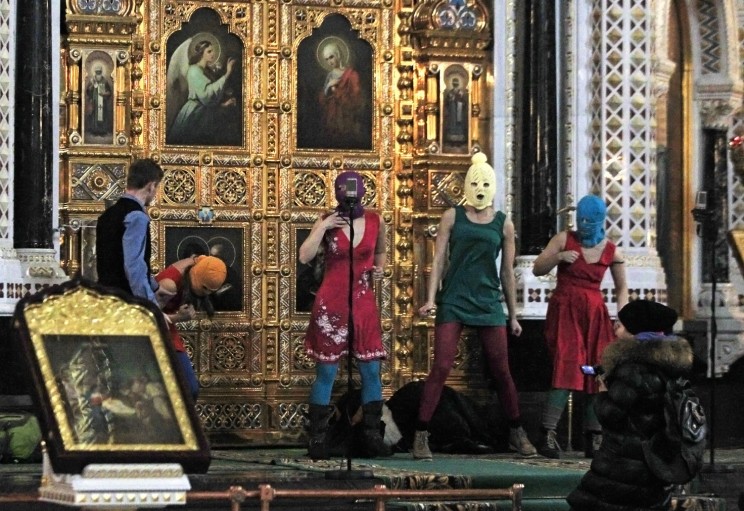
And outrageousness is the point — a public voicing of transgressive and quite fun outrage against a polity that continually (and very earnestly) denies the freedom to outrage. Similar was the famous gesture a couple of years ago by the guerilla art group “Voina” (War): painting a huge phallus on a drawbridge in St. Petersburg that was raised in the face of the former KGB, now FSB, headquarters in the city. Reminding us of the complexity of everything, this effort later won a government-sponsored art prize. By contrast, the “Pussy Rioters” are likely to spend years in jail. In a similar if milder spirit was the answer to Putin’s mocking remark in December that the white ribbons worn by protesters as symbols of opposition reminded him of condoms. In response, a new year’s greeting from Putin with a condom pinned to his lapel went viral on the Internet and social media.
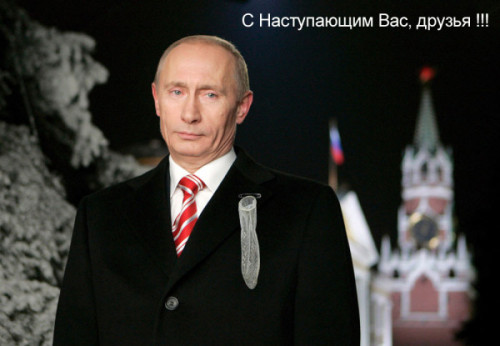
Laughing mockery of power may let off steam. But it may also be a sign of something consequential: that many Russians, audacious and without fear, feel that Putinism has become an embarrassment and a hindrance.
Yet, we should not forget how many Russians are disgusted by this anti-establishment laughter. National polls show widespread support for Putin, especially outside Moscow and Petersburg. The majority of Russians are satisfied with the political situation and believe their country is heading in the right direction. If the government is wise, it will recognize that dissent and even laughing mockery of the icons of authority is part of a “normal” modern society — “normalcy” being an ideal that everyone in Russia seems to agree is the goal. As a historian, I know better than to predict: politicians can be stupid; and citizens, inspired by visions of freedom, can refuse to bow even when faced with the seeming impossibility of their cause.